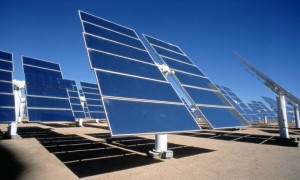
(AFP Photo)
By Sharif Atia
Muhammad Abbas, Governor of the Alexandria governorate, recently launched a new photovoltaic solar energy project in cooperation with the Don Bosco Institute, in what he described as one of the country’s most important projects that will carry enormous benefits for Egypt. He praised the independent nature of the Don Bosco Institute, which he described as playing a pivotal role in working to strengthen educational institutions both in Alexandria and throughout Egypt.
The idea for the project began back in 2009 under the auspices of German, Polish and Italian cooperation, when the country’s first complete solar cell, along with other necessary spare parts, were imported from Germany. Plans to develop the country’s first inverter (an electric converter which converts energy flows from direct currents to alternating currents) were also implemented at the time, in addition to the installation of a photovoltaic processing system on the roof of the Don Bosco Institute, which would help provide lighting for the institute’s roads at night. Beginning in 2011, KWP 10 electricity distribution stations were also installed on the roof of the institute.
Abbas added that students had been trained through a number of courses offered through the Italian Technical Department, which also includes electrical and mechanical departments, to learn to operate advanced technology and machinery used to convert energy and provide electricity to houses.
He pointed out that graduates from the Institute will have in front of them a number of opportunities to participate in the international workforce, both in and outside Egypt, seeing as they will be distinguished by their high efficiency and credentials as technicians, in addition to being fluent in Italian, a fact which will make them more attractive to investors. He added that the European Union in addition to the Egyptian government are prepared to recognize the legitimacy of degrees awarded by the Institute, itself a result of cooperation protocols signed between Egypt and Italy in cooperation with Germany and Poland.
Abbas stated that the project has a promising future, considering that solar energy is clean and renewable and does not give off emissions. He further pointed out that such energy is also highly economical, as solar panels can operate for a period of up to 25 years, requiring repairs only once every five years.
During a celebration held at the Institute, Abbas was honoured with the privilege of granting recent graduates and professors their diplomas and certificates in solar energy production, in addition to opening the Institute’s first electronics laboratory and solar energy plant.
The celebration was attended by Piotr Puchta, the Polish Ambassador to Egypt, Michael Bock, the German Ambassador to Egypt, and Italy’s ambassador to Egypt, Maurizio Massari, in addition to those involved in the administrative and technical side of the project.



